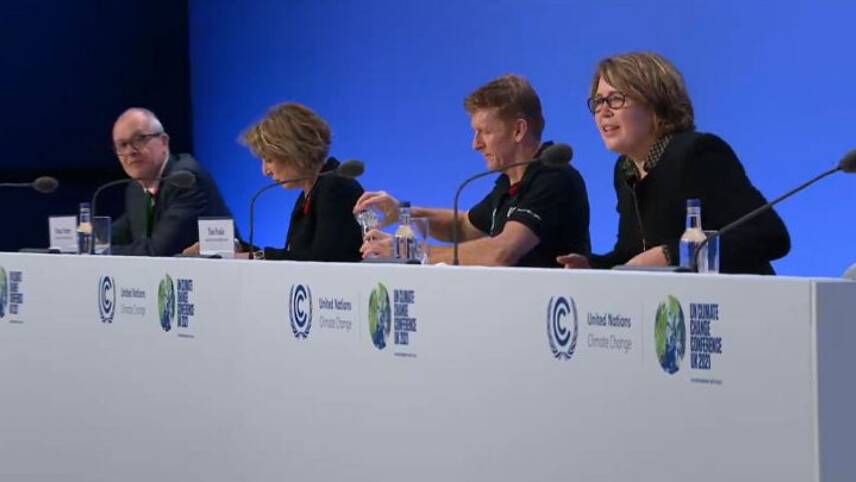Register for free and continue reading
Join our growing army of changemakers and get unlimited access to our premium content

Pictured: A panel from the UN's Government Office for Science
The first major announcement came at midnight, with 23 governments announcing new priority focus areas under the ‘Mission Innovation’ initiative. Building on work already underway to decarbonise hydrogen production and shipping, new workstreams were announced on decarbonising cities and industrial processes; scaling renewable fuels and deploying man-made carbon capture technologies at scale.
Mission Innovation participants collectively represented more than 90% of global public investment in low-carbon energy innovations in 2019. They include Australia, the UK, the EU, China and India. Read more in edie’s full story here.
Announced this morning was an update to the ‘Breakthrough Agenda’, launched last week with an aim of making cleantech more affordable and attractive than high-carbon tech in all geographies by 2030. The scheme has appointed an independent body of experts from the International Energy Agency (IEA), International Renewable Energy Agency (IRENA) and UN High-Level Climate Action Champions to hold participating nations to account. They will support committed nations in strengthening collaboration, encourage other nations to join and produce annual progress reports.
Sectors covered by the Breakthrough Agenda collectively account for more than 50% of global annual emissions. They include steel, road transport and agriculture.
Also announced this morning is a separate Industrial Deep Decarbonisation Initiative (IDDI), whereby nations have committed to disclose the embodied carbon in major public construction projects by 2025 at the latest. This will provide a baseline for developing a 2030 reduction target for embodies carbon, on the road to net-zero by 2050. The governments of the UK, the United Arab Emirates (UAE), India, Germany and Canada are participating.
And, separately, the UK and Italy, as partners in the COP26 Presidency, are establishing a new research partnership to address “key challenges” hampering progress towards a low-carbon and climate-resilient future.
Lastly, the UK Government has announced a standalone £7m fund for space innovation, with a focus on climate and environmental management. Projects to receive support include a network of satellites measuring thermal emissions from buildings – identifying energy inefficiency hotspots – and the concept for a forest management tool that will monitor the health of ecosystems from space.
Adaptation update
Announcements on Adaptation finance from nations were scarce yesterday, despite Alok Sharma promising a statement in the afternoon.
This morning, some of this information has finally been forthcoming. An Adaptation Research Alliance (ARA) has been launched, convening 90 governments, research institutions, community groups and academics in a drive to increase the resilience of communities most affected by climate change.
The ARA’s first major programme is called CLARE and is jointly funded by the UK and Canada, to the tune of £110m. The scheme will support the development and rollout of solutions to benefit at least five million people, predominantly in Africa.
Separately, 47 countries that represent more than one-third of the world’s healthcare emissions have committed to transforming healthcare systems so that they are climate-resilient and low-carbon. Participants in this pledge include Malawi, Spain, Morocco and the US.
Spotlight on gender
As well as being Science and Innovation day at COP26, today’s programme also has a focus on gender.
There are many ways in which the climate crisis and gender intersect. Research has repeatedly shown that women are more likely than men to be displaced by physical climate impacts than men.
Moreover, the fact that there is not yet global equal access to education and to family planning services is preventing many women from participating in climate solution development and implementation, as explained by Project Drawdown.
Additionally, women have not historically been properly represented in governments and businesses present at international climate talks like COP26. The She Changes Climate campaign has been calling on all parties to put forward a 50/50 delegation of diverse women at top levels.
We can expect initiatives aiming to address these issues to be announced later in the day. This morning, the UK has earmarked £165m for initiatives to support women in the Asia-Pacific region participate in activities including green finance and climate adaptation scheme delivery.
Stay up-to-date with the latest news from COP26 with edie’s Live Blog.
Sarah George


Please login or Register to leave a comment.